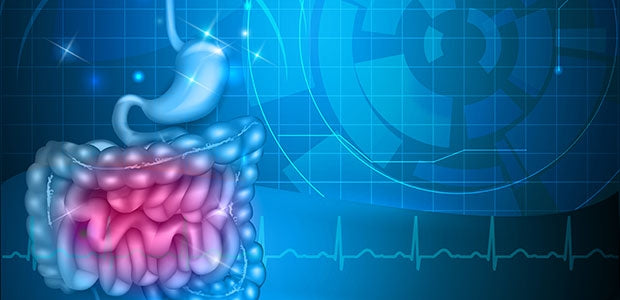Intestinal dysbiosis: a very real health issue
Véronique Cousineau; ND, RHN
The human digestive system is undeniably complex. In recent years, the intestine has been the focus of a great deal of research, and science is increasingly confirming that our intestinal flora acts as a determinant of our health.
In fact, the intestine is host to just over 500 different microbial species. There are nine times as many bacteria in the intestine as there are cells in the entire body. These organisms live together and ensure the digestion of food, the foundation of our immunity and the manufacture of neurotransmitters (biochemical messengers that regulate mood). Thus, the type and number of bacteria in the gut play a decisive role in health and disease prevention.
It's only natural to expect these organisms to coexist harmoniously. Unfortunately, at least 85% of today's population suffer from an imbalance in their intestinal bacterial flora. This condition is known as intestinal dysbiosis or dysbacteriosis.
What is dysbiosis?
Dysbiosis is characterized by an imbalance in the normal intestinal flora, leading to undesirable effects. It's a very common condition, with a wide range of symptoms.
Unfortunately, in allopathic medicine, it is rarely investigated, and therefore not usually addressed in a conventional treatment plan. So, while the concept remains relatively new in North America, the notion of dysbiosis has largely inspired and influenced the last four generations of European medical physicists.
There are many causes of intestinal dysbiosis:
- Birth by Caesarean section;
- Antibiotic use;
- Consumption of sugars and processed grains;
- Lack of fiber in the diet;
- Overconsumption of meat;
- Stress;
- Excessive alcohol consumption;
- Lack of digestive enzymes;
- Taking oral contraceptives;
- Steroid use;
- Taking cortisone.
These factors disrupt the normal bacterial flora of the intestines, allowing pathogenic (undesirable) organisms to multiply further. That said, it is always possible to reverse the condition, especially through prevention or as soon as the first symptoms appear.
Symptoms and complications
It's important to understand that no digestive symptom is trivial. If you experience digestive discomfort on a regular basis, this is already a warning sign. That said, unbalanced intestinal flora has been linked to a multitude of symptoms that extend far beyond digestive problems:
- Digestive symptoms Diarrhea, constipation and/or alternating between the two, allergies, food intolerances, Crohn's disease, diverticulitis, reflux, ulcers, ulcerative colitis, gas, intestinal bloating, cirrhosis, fatty liver.
- Psychological symptoms Anxiety, panic, depression, mood swings, irritability, attention and concentration problems, memory loss, chronic fatigue, premenstrual syndrome, attention deficit, autism.
- Urito-genital symptoms Recurrent vaginal infections, prostatitis, urinary tract infections, pelvic itching, pelvic pain, decreased libido, rectal itching, endometriosis.
- Musculoskeletal symptoms Musculoskeletal symptoms: muscle pain, arthritis, ankylosing spondylitis, rheumatism, fibromyalgia.
- Metabolic symptoms Hypertension, cardiovascular disorders, diabetes, cancer.
- Other symptoms Headaches, food cravings, lethargy, fungal infections of skin and nails, skin disorders (eczema, psoriasis, acne, rashes).
Of course, we're not all prone to reacting so strongly to an imbalance in the intestinal flora. Indeed, there seems to be a genetic factor in the way the intestinal membrane reacts to changes in bacterial flora.
What's more, if you have any of the conditions listed above, there may be other triggers and aggravating factors worth investigating. This is especially true for psychological and mood disorders. However, I can assure you that anyone who takes steps to address intestinal dysbiosis will experience a reduction in symptoms, whatever they may be.
Recommendations
Obviously, we need to address the source of the problem and add probiotics (healthy bacteria that colonize the gut) to the diet. Fermented foods such as sauerkraut, kefir, yogurt and kimchi, miso and kombucha provide your intestinal flora with good bacteria. Taking probiotics supplements may also be necessary in certain cases.
It is essential to address the diet and avoid sugars and processed foods, while reducing meat, alcohol and coffee consumption. Vegetables and legumes should be prioritized, as they provide plenty of fiber (prebiotics, including probiotics, will feed you) without containing large amounts of sugar.
If these measures aggravate symptoms or cause intestinal disturbances, you'll need to investigate further with a naturopath by visiting a health food store or making an appointment.
verosante.com



1 comment
En effet, il semble que le microbiote soit un véritable enjeu santé dans le futur. Si cela vous intéresse j’ai trouvé cet article (https://www.nutrimis.com/blog/quel-lien-existe-t-il-entre-dysbiose-et-maladies-neurodegeneratives/), qui traite notamment des effets d’une dysbiose au niveau des maladies neurodégénératives.